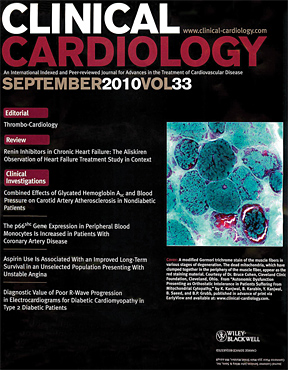 When doctors across the country received a recent edition of the journal Clinical Cardiology, the first thing they saw was a new breakthrough at The University of Toledo Medical Center.
When doctors across the country received a recent edition of the journal Clinical Cardiology, the first thing they saw was a new breakthrough at The University of Toledo Medical Center.
The research titled “Autonomic Dysfunction Presenting as Orthostatic Intolerance in Patients Suffering From Mitochondrial Cytopathy” was featured as the cover story in the September issue of the international journal. The article presents the findings from a study of the autonomic nervous system and is a culmination of more than two decades of research led by Dr. Blair Grubb, Distinguished University Professor of Medicine and Pediatrics.
“The autonomic nervous system regulates the very processes that maintain life itself: blood pressure, heart rate, breathing, body temperature, bowel motility and genital-urinary function,” Grubb said. “The system usually works so well you do not notice it; indeed you only become aware of it when it is not working.”
When the system stops working is where the study begins. Researchers at UTMC first investigated a condition called neurocardiogenic syncope, which is when a person’s blood pressure suddenly falls too low and they lose consciousness. During that initial investigation, researchers found other ways in which the system could be disrupted.
“As time went on, we found that other disease states, such as diabetes, could adversely affect autonomic function. For example, we observed that traumatic brain injury could cause autonomic problems,” Grubb said.These new discoveries led Grubb’s team in a new direction in their research.
“We then began to look at a little-known group of disorders called mitochondrial cytopathies. The mitochondria are small bacteria-like organelles within human cells that generate energy for normal cellular function,” Grubb explained. “The mitochondria can stop working properly if they lack any one of a series of critical enzymes. This has been known to cause muscle weakness and wasting, as well as disturbances in brain and gastrointestinal function.”
What they discovered next is what landed the research team on the Clinical Cardiology cover: Mitochondrial disorders also could cause severe problems in autonomic nervous system function. Such disorders disturb the autonomic nervous system function by impacting the ability to regulate blood pressure and heart rate, which can cause patients to experience weakness, vertigo and an inability to exercise, as well as recurrent fainting.
This breakthrough was the first time that mitochondrial disorders were found to be the cause of autonomic nervous system problems.
“This recognition will allow a group of patients to be identified as having a mitochondrial disorder much earlier than before, permitting treatment to begin sooner then before,” Grubb said.
This is the 20th peer-reviewed article the research team has published this year. Grubb said the success of this study would not have been possible without the help of an outstanding team of co-investigators: Dr. Beverly Karabin, Dr. Yousuf Kanjwal and Dr. Bilal Saeed, UT colleagues, and Dr. Khalil Kanjwal, formerly of UT and now with Einstein University in Philadelphia.